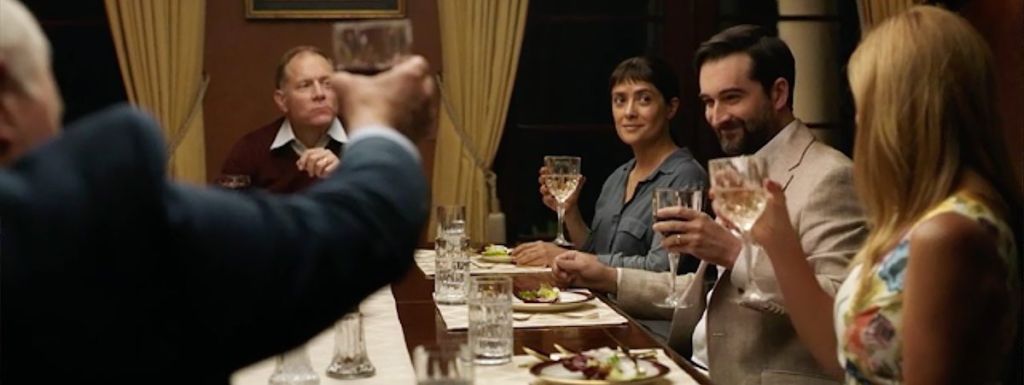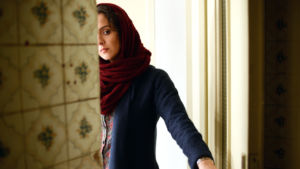A most salient portrait of evil
 When Miguel Arteta and Mike White started filming Beatriz at Dinner last August, I doubt they could have predicted how salient the film would be when it was released ten months later. The biting, mostly comic commentary on class, race and manners is particularly unsettling because Trump won, because what may have been written as satire a year ago is naked reality now. It’s a tragicomedy, but in our country’s current predicament, its more tragic, making the film’s bleak ending creepily logical. Arteta and White are known for their awkwardly brilliant collaborations Chuck & Buck and The Good Girl (among other things), and Beatriz, while not achieving the levels of those two films, is another affecting, often very funny cringe-fest.
When Miguel Arteta and Mike White started filming Beatriz at Dinner last August, I doubt they could have predicted how salient the film would be when it was released ten months later. The biting, mostly comic commentary on class, race and manners is particularly unsettling because Trump won, because what may have been written as satire a year ago is naked reality now. It’s a tragicomedy, but in our country’s current predicament, its more tragic, making the film’s bleak ending creepily logical. Arteta and White are known for their awkwardly brilliant collaborations Chuck & Buck and The Good Girl (among other things), and Beatriz, while not achieving the levels of those two films, is another affecting, often very funny cringe-fest.
Salma Hayek is Beatriz, a Mexican immigrant healer who specializes in various forms of massage and mysticisms. After working on her very rich longtime client Cathy (Connie Britton) in Newport Beach, her car won’t start, and Cathy asks her to stay for dinner. Cathy and her husband Grant (David Warshofsky) are hosting billionaire Doug Strutt (John Lithgow), his wife Jeana (Amy Landecker), and a younger couple Shannon and Alex (Chloë Sevigny and Jay Duplass). Beatriz is wildly out of place, not just because she’s working class and a recent immigrant, but rather because she’s not a toxic capitalist, like the hosts and their friends. Strutt is Trump crossed with Rupert Murdoch, a real estate mogul who thinks that because he owns valuable things he is a more valuable person than anyone else. He delights in hunting endangered wild game, tells his wife she’s “well-compensated,” and thinks it’s appropriate to interrogate the one non-white person at the dinner over her method of immigration. (It was legal, by the way.)
Beatriz has a few too many glasses of wine and does not behave as the rich folk think poor Mexicans should: she slyly snarks back at Strutt’s rude questions, interrupts her hosts inane conversation with her own substantial stories, and, worst, tells people that their behavior is immoral. Most of the humor comes from the appallingly petty cocktail chatter uttered by Shannon, Alex and Jeana, but it seems that before Trump’s election Strutt’s amoral arrogance would have also seemed satirical and funny. Now it feels simply evil. As White has done throughout his career, he takes conversations and monologues much further than most writers would dare, and Strutt’s monologues, expertly delivered by the great Lithgow, are chilling, both believable and discomfiting. Beatriz’s reactions evolve, unnervingly, from witty to wanton.
Arteta’s grainy, naturalistic shots work well for the Newport estate where most of the film takes place, exposing both the blemishes of the seemingly sanitized wealth and its enviable beauty. His ensemble is perfectly cast and they all do great work. Duplass and Sevigny are hilariously dreadful, both clearly delighting in saying White’s more scathing lines. Britton, playing the only sympathetic rich person, achieves the balance of cluelessness and kindness with seeming ease (an ease we’ve come to expect from her in any role). Hayek’s performance is one of her best; calm and wise, sad and pointed. But Lithgow’s performance is truly great in its representation of truly banal, utterly unsurprising evil.
Beatriz at Dinner
Directed by Miguel Arteta
Written by Mike White
Starring Salma Hayek, John Lithgow and Connie Britton
Rated R
Originally published in LGBT Weekly
 Outside of cinephiles who have seen his Oscar-winning A Separation, Asghar Farhadi is not well known among Americans. But his name was thrust into the news over the last few weeks because of President Trump’s executive order banning travel of most anyone, but particularly Muslims, from seven majority Muslim countries. (The list does not include any majority Muslim country where Trump and his family have business dealings. Of course.) Because of the ban, Farhadi, who is from Iran, cannot travel to the United States for the Academy Awards, where his newest film The Salesman is up for Best Foreign Language Film; even if the stay of that order allows his visit, Farhadi is boycotting in protest.
Outside of cinephiles who have seen his Oscar-winning A Separation, Asghar Farhadi is not well known among Americans. But his name was thrust into the news over the last few weeks because of President Trump’s executive order banning travel of most anyone, but particularly Muslims, from seven majority Muslim countries. (The list does not include any majority Muslim country where Trump and his family have business dealings. Of course.) Because of the ban, Farhadi, who is from Iran, cannot travel to the United States for the Academy Awards, where his newest film The Salesman is up for Best Foreign Language Film; even if the stay of that order allows his visit, Farhadi is boycotting in protest. Death of Salesman seems to have no clear connection to the film’s plot until the last 20 minutes. Then, Miller’s commentary on obligation, illusion, sacrifice and failure are reimagined through Emad and Rana’s acting out of their moral duties as well as an American play. If there is any justice, publicity over Farhadi’s absence from the Academy Awards will lead American audiences to experience his art and his insight into America’s greatest drama.
Death of Salesman seems to have no clear connection to the film’s plot until the last 20 minutes. Then, Miller’s commentary on obligation, illusion, sacrifice and failure are reimagined through Emad and Rana’s acting out of their moral duties as well as an American play. If there is any justice, publicity over Farhadi’s absence from the Academy Awards will lead American audiences to experience his art and his insight into America’s greatest drama.